IIT Madras professors get great award
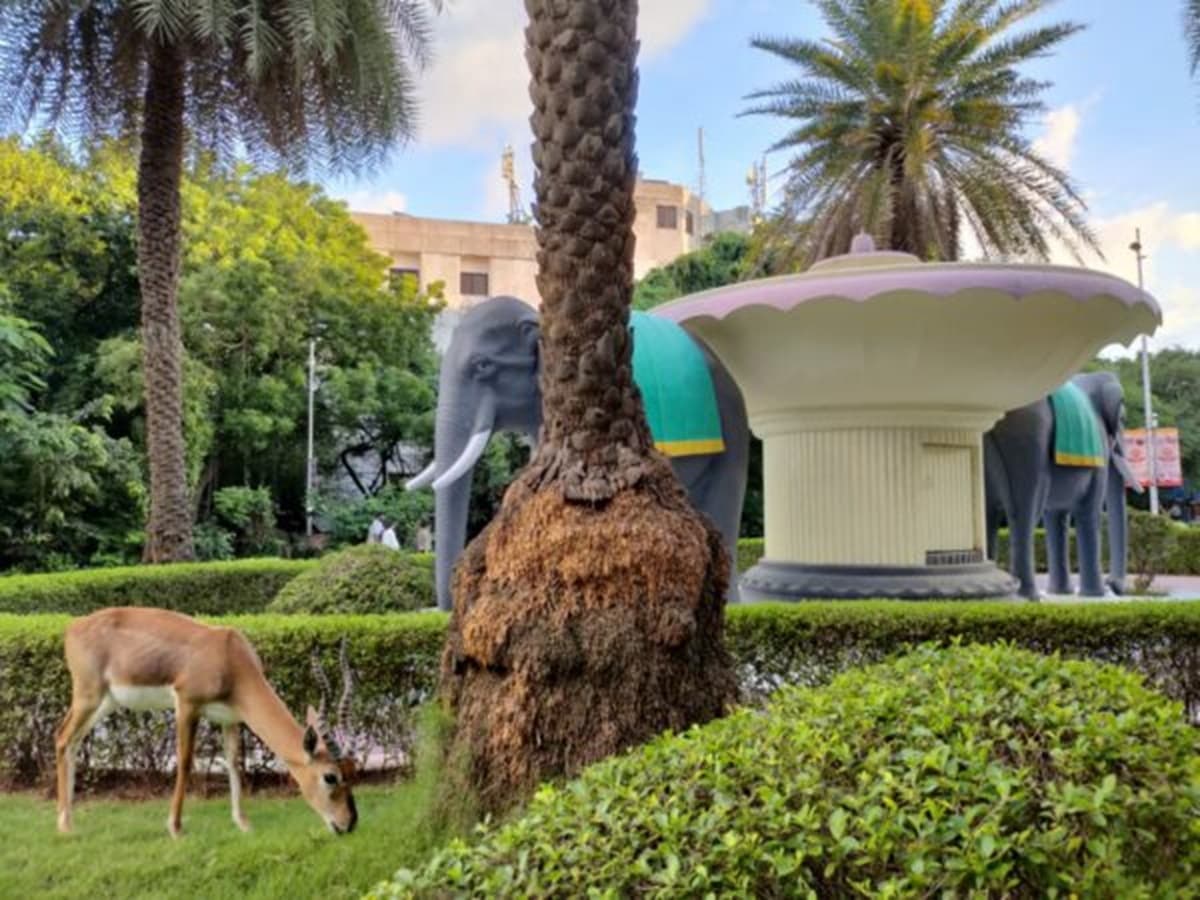
IIT Madras professors have won ‘Rashtriya Vigyan Puraskar: Vigyan Yuva Shanti Swarup Bhatnagar.’
The prize was received from President of India Droupadi Murmu on 22 August 2024 in New Delhi.

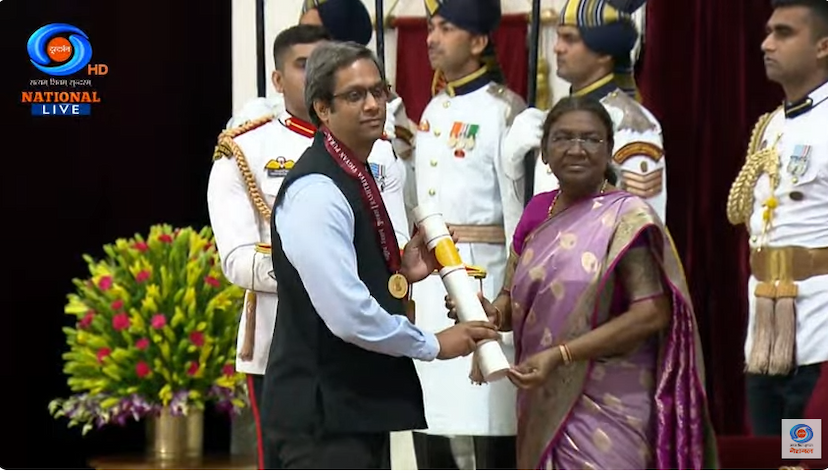
They were selected for this award, formerly known as the ‘Shanti Swarup Bhatnagar’ Prize, in recognition of their outstanding work in science and technology.
Prof Prabhu Rajagopal
Prof. Prabhu Rajagopal, who is also the Advisor (Innovation and Entrepreneurship) at IIT Madras, pioneered the automated ultrasonic inspection of marine and fluid-handling assets such as pipes, terminals and tanks using tethered and automated submersible vehicles.
He has made seminal contributions to remote Non-destructive Evaluation of structures and processes through advances in ultrasonics and robotics, as well as guiding multiple start-ups in taking these innovations to the field, say sources from IIT Madras.

Prof Radhakrishna Ganti
Prof. Radhakrishna Ganti focuses on indigenous hardware and wireless communications stack development. In the first-of-its-kind facility in India.
Prof. Radhakrishna Ganti led the development of 5G radio systems at IIT Madras. His team is currently designing 6G technologies.
Prof. Ganti made several contributions to global standards bodies and spearheaded the development of Rural use cases in ITU (International Telecom Union) to provide modern telecom access and connectivity to remote and rural areas.

His work on stochastic geometry for the analysis of wireless and cellular networks is globally recognized, say sources from IIT Madras.
Director of IIT Madras
Director of IIT Madras Prof V Kamakoti congratulated the professor on winning the award.
‘Faculty of IIT Madras are involved in transformational research for at least the last two decades.’
The outputs of these efforts have led to products of great national importance, he said.

I am very proud that two of my colleagues have been awarded the Bhatnagar prize this year for their stellar contributions in their respective fields that have led to technology of great national and societal relevance, he said.
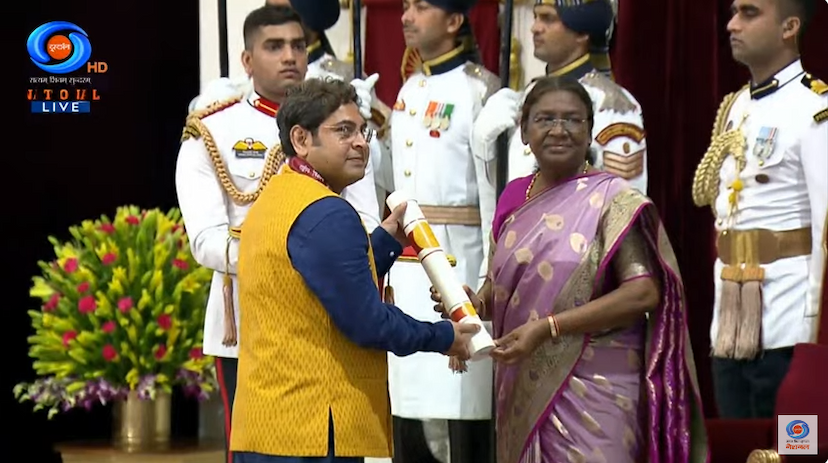
Being passionate about fundamental ‘blue sky’ research as well as technology translation to solve practical real-world problems in industry and society.
I am happy to note that this award underlines my work in technology and innovation.
This award is an affirmation to young scientists and technologists across India, that stepping forward to solve pressing challenges such as access to scalable technologies for healthcare, sanitation and industrial process efficiency is appreciated, he said.
He further said ‘I take this opportunity to thank my mentors, industry collaborators, students and start-up co-founders and investors who have guided and anchored my journey over the years.’
My sincere appreciation to the administrators at IIT Madras including former and current Directors, Deans and HoDs who have nurtured a culture of excellence and support for Innovation and Entrepreneurship creating one of the best ecosystems for deep-tech startups in India, he said.
My gratitude to my parents, brother (and his little son who always comes to my Laboratory with wonder eyes) and wife Dr. Tamaswati Ghosh who have patiently supported me and endured the years of seemingly unending hours at work, he said.
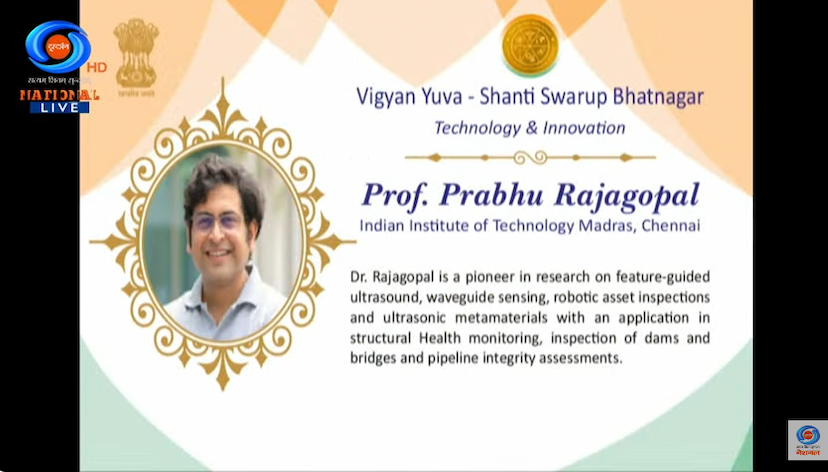
I am grateful that my work in developing and building wireless systems is recognized and I hope that it would encourage more researchers and faculty to do systems work, he said.
Prof further said he had the privilege of working with excellent researchers who have helped me at various stages to significantly contribute to the vision of India-led wireless standards and lay the foundation for an indigenous wireless ecosystem in India.
I want to thank my mentors, teachers, colleagues and friends who encouraged me to pursue what I enjoyed and helped me along the way, he said.
I wish to express my sincere gratitude to Prof. Bhaskar Ramamuthi and Prof. V. Kamakoti as well as the entire IIT Madras administration for their excellent support throughout the years and for their invaluable advice.
I deeply appreciate the support of MeiTY and DOT for their financial grants as well as their steadfast support in the development of indigenous technologies and standards, he said.
I want to thank my parents for their belief and confidence in me and my in-laws for their constant support.
My special thanks to my wife Sambhavi and my son Eswar Prakash who always stood with me, supported me through the journey and share my dream and passion for Atmanirbhar Bharath, he said.
About Prof Prabhu Rajagopal
Prof. Prabhu Rajagopal has studied bio-inspired propulsion leading to new tools for homogenising sludges eventually forming the basis for robots for mechanised cleaning of septic tanks.
His work on ultrasonic metamaterials has immense possibilities for high-resolution imaging and structural shielding from environmental and seismic disturbances.
His research contributions include:
Ø ALID, the most widely used technique across the world for simulating unbounded domains
Ø Discovery of novel feature-guided wave modes leading to new methods for condition monitoring of pipelines, bent structures and composite joints
Ø Robots including, SepOYE (septic tank inspection), m-Hull (AUV) and Shobot (human-assistive cobot)
Ø Distributed ledger based management of bone healing using ultrasonics
Key startups to emerge from his work include
Ø Planys Technologies (National Entrepreneruship Award 2019, National Startup Award 2020, Aegis Graham Bell Award 2021)
Ø Solinas Integrity (Economic Times Startup Award 2022, Shark Tank India, Ashirwad THE/Nudge Prize 2023)
Ø Xyma Analytics (Aegis Graham Bell Award 2022, National Technology Award 2023)
Ø Plenome Technologies (AWS Campus Challenge 2023)
Prof. Prabhu Rajagopal is working on several areas including Distributed and quantum AI technologies offer novel ways of improving upon the security and training limitations of classical AI.
Key products commercialised through the startups:
Ø Mike, Mikros and Beluga series of tethered robots for submerged asset inspections (deployed at 50+ locations in India, Middle East and Europe through Planys)
Ø Svayatt series of automated underwater vehicles for surveillance, water body mapping and defence applications (being commercialised through Planys)
Ø Endobot series for robots for inspections of water and sewer pipelines – (deployed at over half a dozen smart cities across India through Solinas)
Ø Globus robot for passive monitoring of pipelines (commercialised through Solinas)
Ø HomoSEP series of robots for mechanised cleaning of septic tanks and elimination of manual scavenging (deployed over 25 locations across India through Solinas)
Ø BlockTrack Hub and Plenome Ayush app for digitization and data integrity management in healthcare and voting (commercialised through Plenome and currently deployed or being piloted at several hospitals and student elections)
Ø Xero series of XR models for real estate and plant site management (deployed at several projects across Chennai through Xeroscape)
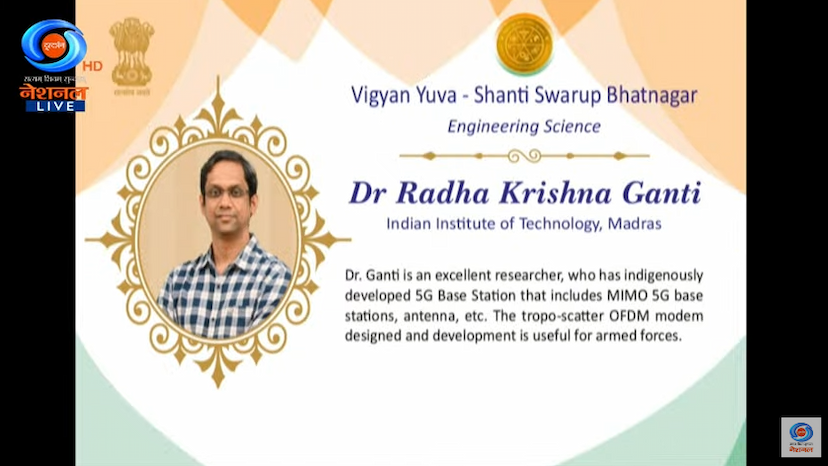
He is an expert in the area of wireless system design, 5G cellular systems, wireless hardware systems, and stochastic geometry.
He has built a state-of-the massive-MIMO radios and its associated software towards indigenisation efforts.
Prof. Radhakrishna has been continuously working with DRDO (and other defence organisations) and helping them develop local capabilities in wireless communications.
An example of this is the Tropo-scatter OFDM modem designed, developed and tested (by him and two of his colleagues) which has been manufactured and now is being used by armed forces.
In fact, from importing troposcatter modems, India is now exporting these modems to other countries
His Research Contributions include
1) Application of stochastic geometry to the analysis of wireless networks
2) Development of key technologies like full-duplex, pilotless Massive MIMO systems and newer algorithms and architectures for 5G and 6G systems
3) Instrumental in driving the Low Mobility Large Cell (LMLC) requirement in ITU which focused on improving rural coverage
4) Development of indigenous 5G systems (hardware and software) in collaboration with other IITs and other research institutions.
This technology has been transferred to companies for commercialization.
The 5G infrastructure (hardware and software) developed at IIT Madras is a state-of-the art system and provides a basis for starts-ups and smaller companies in India to build their 5G products.
Prof. Radhakrishna Ganti’s future goals include working on the development of next-generation wireless systems like 6G with an emphasis on AI/ML and the development of systems to meet the Indian requirements in commercial and defense applications.
S Vishnu Sharmaa now works with collegechalo.com in the news team. His work involves writing articles related to the education sector in India with a keen focus on higher education issues. Journalism has always been a passion for him. He has more than 10 years of enriching experience with various media organizations like Eenadu, Webdunia, News Today, Infodea. He also has a strong interest in writing about defence and railway related issues.






